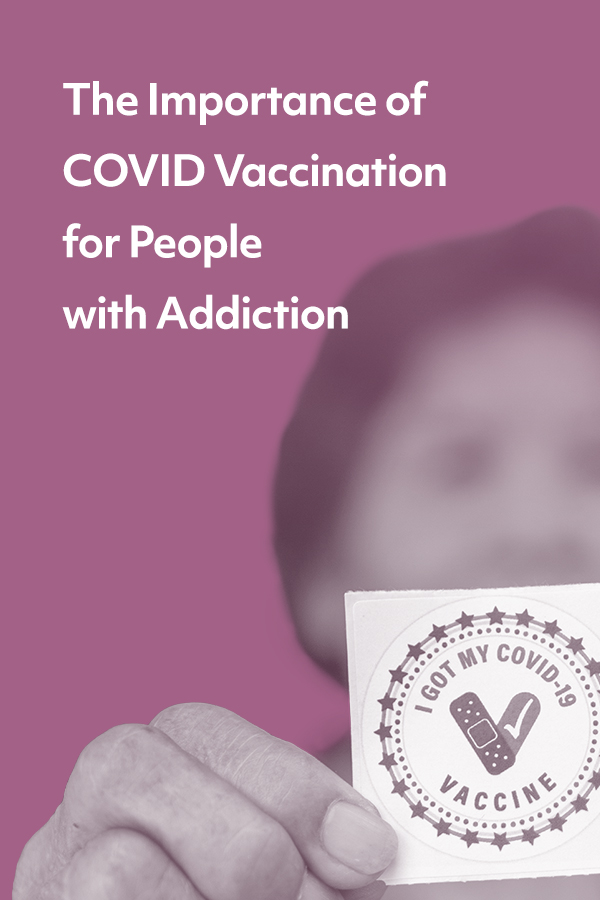It’s especially important for those with substance use disorders to get vaccinated against COVID.
The COVID-19 pandemic has parallels with substance use disorder: both have impacted populations globally, often fatally. While the nation has struggled to cope with the harsh realities of the pandemic—isolation, social distancing, and the tragic loss of loved ones—it has resulted in increased drug and alcohol use and fatal drug overdoses. To make matters worse, those with substance use disorders are more susceptible to COVID-19 and its complications, emphasizing the need for vaccination.
As a result, substance use disorders have been identified by the Centers for Disease Control and Prevention (CDC) as a significant risk factor for becoming severely ill from COVID-19.
Increased substance use during the pandemic
The Centers for Disease Control and Prevention indicate that increased stress from the pandemic has escalated drug and alcohol use. By June 2020, just a few months into the pandemic, there was a reported 13 percent increase in substance use as a means of coping with emotions, stress, and feelings of isolation. The pandemic also resulted in an 18 percent increase in fatal drug overdoses compared to the same period in 2019. This increased use places people with addiction at a higher risk of contracting COVID-19.
Why are people with addiction at greater risk of COVID-19?
According to the CDC and the National Institute on Drug Abuse, people with substance use disorders are at a much higher risk of getting COVID-19 and suffering from its worst outcomes.
This is primarily due to factors associated with drug use:
- Underlying conditions: Patients with SUD had significantly higher prevalence of chronic conditions, like heart and lung diseases, diabetes, and cancer. It is those underlying medical conditions that put individuals with SUD at an increased risk to get severely ill from COVID-19
- Group use: some people who use drugs can do so in a group setting that doesn’t adhere to social distancing requirements, increasing the risk of virus spread
- Compromised lung function: some drugs can slow breathing and exacerbate lung conditions like asthma and COPD
Researchers suggest that chronic heart and lung conditions are the main causes of this increased risk among this population, particularly among African Americans. This data has led public health experts to call for vaccinations to be a priority for this risk group, as well as for providing addiction treatment support as part of the strategy to control the COVID pandemic.
Why we should prioritize people with SUD getting vaccinated
The COVID vaccine has been available in the US for all people over the age of 12. However, some people have been hesitant to get vaccinated. This reluctance isn’t exclusive to those with substance use disorders, as some other people (particularly those in rural areas) have their own hesitations too. Despite these concerns, NIDA confirms there is no evidence that COVID-19 vaccines are less safe or less effective for people who use substances or for those using medically-assisted treatment for addiction.
Dr. Nora Volkow, Director of NIDA says that for people with substance use disorder, the benefits of receiving the vaccine go well beyond reducing the risk of contracting or experiencing the worst effects from COVID-19. She says that vaccination enables people to gather together again—an important component of sustained recovery.
“Isolation is a risk factor for relapse to drug use, and recovery groups have had to suspend in-person meetings this past year. For some, virtual meetings have been a lifeline; for others, they are not an adequate substitute for face-to-face interactions and may not even [be] possible.”
She contends that for people with addiction—whose symptoms may have been exacerbated by the stress of isolation—vaccination will bring a return to normalcy, including greater access to social support.
While some folks may be concerned about receiving stigmatizing treatment from a provider, Volkow allays those fears, saying that there shouldn’t be any privacy concerns. “People who use drugs also need not have privacy concerns when obtaining a vaccine for fear of having to disclose past or present drug use. Providers administering COVID-19 vaccine will not ask about your substance use. Recipients will not need to disclose information about medical history, other than known allergies to vaccines or immune- or blood-related conditions potentially relevant to receiving a vaccine.”
For more information about patient safety and side effects, you can watch this webinar led by Dr. Anthony Fauci, head of the National Institute of Allergy and Infectious Diseases and chief medical advisor on the pandemic to President Biden.
How to get vaccinated
Most medical providers have vaccination programs within their state. However, if you do not have access to a medical provider or are unable to reach a vaccine location, the CDC says you can refer to your state or local health department for information. You may be eligible to receive help from the vaccine ambassador program.










